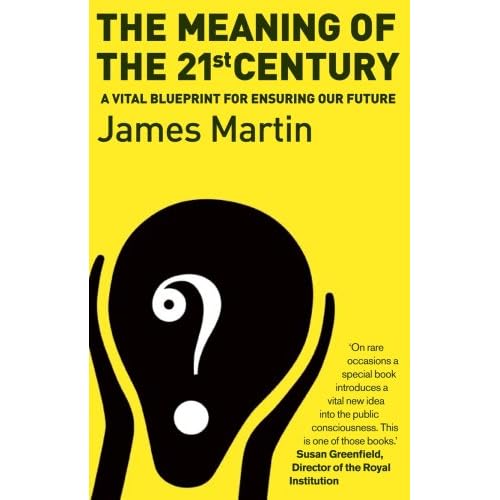
The basic thesis of this excellent book is that the 21st century will be a transformative era in human history, the book is partly in response to Lord Martin Rees' Our Final Century.
Unlike Rees, Martin is optimistic about human-beings surviving the 21st century. Martin feels that although the challenges are huge and there will be the potential for catastrophic failure (in the form of the human race ceasing to exist or civilization simply collapsing) we will still be able to tread a path to a better world.
James Martin believes that the trends in economic, demographic, technological, and social change will lead humanity into a period of history that will seem like white-water rafting after centuries of relatively smooth sailing.
Advances in areas like computing, nanotechnology, high-bandwidth communications, low-CO2 emitting power generation, genetic engineering of foodstocks and human beings, transhumanism, biotechnology, direct brain-computer links, and human augmentation will cause tremendous change and offer great promise.
But while this is happening there are also huge problems to be dealt with in the form of environmental degradation, climate change, collapsing of world fish stocks, overpopulation, nuclear war, bio-war, terrorism, failed states and poverty stricken "fourth world" countries.
After this transitional period we can build an ever more wonderful and exciting civilization.
Martin has faith in the idea of technological ingenuity and entrepreneurism solving many of the problems we are faced with.
The book reads rather like a series of slide presentations cobbled together. It's enjoyable to read and doesn't tax the mind with high-falutin' concepts (the book is apparently based on a TV series).
But I feel in his haste to make everything explicable and easy to understand Martin has left out some of the innate complexity in what he suggests.
For example his suggestions as to how to solve the problem of the development of dangerous technologies (genetically engineering viruses; cheap, portable nuclear bombs) are based around the precautionary principle, an idea I'm not entirely comfortable with.
The precautionary principle is applied when scientists are concerned that a particular line of research will lead to the creation of an immensely dangerous weapon. They will make a decision to stop pursuing that line of research.
The most obvious example is a smallpox virus, modified so as to be resistant to any vaccines that exist
The problem is that science thrives when there is a back-and-forth of knowledge and information. The precautionary principle would threaten that. If scientists decide to "hold back" in acquiring and disseminating knowledge and discoveries then the scientific community could become balkanised and fractured.
More seriously, just because one group of researchers (or their financial backers) decide to obey the precautionary principle doesn't mean there will be others who would seek their own advantage in the inaction and withdrawal of their competitors.
It is also likely that such a group will carry out their research in secret, without the overview and transparency required when dealing with potentially dangerous areas of research.
Any weapons or dangers that do emerge would then be completely hidden from everyone else, making the developments even more threatening and dangerous.
And if these weapons were used then none of the reputable and precautionary-principle obeying researchers would have the knowledge required to counteract the problem.
Although I believe advancing technology will render our current concepts of privacy irrelevant Martin is too keen to advocate extending state-control in the pursuit of terrorists.
However the vast majority of what he says makes sense. He is in favour of pebble-bed nuclear reactors, he is in favour of reducing population by educating and liberating women. He wants to extend to poor countries all the benefits and advantages of prosperous liberal democracies.
The book positively vibrates with buzz-words. One of the better ones is "eco-affluence". This is the idea that we can live happy and prosperous and enriching lives without destroying the environment. "Eco-affluence" will soon be picked up by politicians and used to describe an ideal situation for humanity.
He also discusses the idea of the singularity and non-human-like intelligence. NHL intelligence is distinct from "traditional" conceptions of AI because it concerns evolutionary programs, programs that try vast numbers of possible solutions to problems and select from those that work, learning techniques, pattern recognition and data mining.
In fact it concentrates on what computers have potential for and leaves human minds to do the stuff we have potential for, in conjunction with our computer helpers.
In conclusion, this is a must-read for everyone, particularly if you need a basic primer on where we're going as a species, the challenges we are faced with, what the opportunities are, and what human civilization will look like 92 years from now.

1 comment:
Great work.
Post a Comment